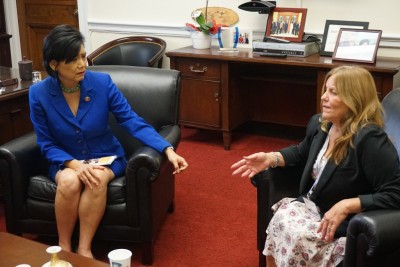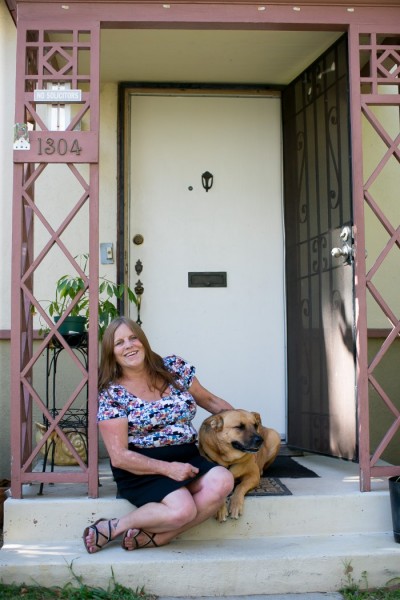
Congresswoman Judy Chu listens to Homeless advocate Dorothy Edwards
(3-14-16)
“Meet Dorothy Edwards. Just a few years ago, she lived with her dog, Gunner, under a freeway overpass in Greater Los Angeles. She was heavily addicted to drugs and couldn’t find a way to get off the streets. “I craved a place of my own,” she said. “I watched people who, day after day, helped me out and handed me money. I thought, I know they’re leaving and they’re going home. I was hurting and needed a home too.”
This is how the story that I’ve posted below begins: Dorothy Edwards — homeless and addicted.
But that is not how I know Dorothy. I know her as a delightful and caring fellow member of the Board of Directors of the Corporation for Supportive Housing, a national non-profit organization that in the past three years has overseen the disbursement of $183 million in loans to build supporting housing.
That’s right. A former homeless woman with addiction issues is now helping oversee the successful building of 18,379 supportive housing units across our country and the delivery of services to more than 58,000 individuals.
Dorothy is not only an inspiring colleague, she illustrates the potential of individuals if they are given the help that they need to move forward with their lives. She is one of my heroes and one of the reasons why I’m proud to serve on the CSH board.
Over the years, I have become convinced that housing, especially Housing First, is crucial for helping persons with serious and persistent mental illnesses and substance abuse problems recover. How can anyone get better if they have a serious mental illness and co-occurring addictions and are homeless?
This is why I am grateful that USA Today recently spotlighted Dorothy’s journey in its ongoing series about the need for mental health reform in America and Bill Pitkin wrote about her in the Washington Monthly. (below.) Each time she tells her story, she is putting a human face on the need for community services, compassion, recovery and hope. And she always does it with a smile.
The next time you see someone who is homeless crouched under an underpass with a mental illness and/or substance problem remember my friend Dorothy and think about how that individual might be able to enrich all of our lives if they had a safe place to live.
Combating Homelessness
by Bill Pitkin, Conrad N. Hilton Foundation
Meet Dorothy Edwards. Just a few years ago, she lived with her dog, Gunner, under a freeway overpass in Greater Los Angeles. She was heavily addicted to drugs and couldn’t find a way to get off the streets. “I craved a place of my own,” she said. “I watched people who, day after day, helped me out and handed me money. I thought, I know they’re leaving and they’re going home. I was hurting and needed a home too.”
Today, with the help of dedicated outreach workers, Dorothy has found a home where she can live with her dog, off drugs and off the streets. In fact, she now works as an advocate for homeless people and sits on the board of directors of the Corporation for Supportive Housing, a national organization that helps build housing that lets homeless and disabled people connect to homes, health care, jobs, and the community. In the past year, she has traveled to Sacramento and Washington, D.C. to discuss her experiences and share recommendations with policymakers and elected officials.
What helped Dorothy get back on her feet was an innovative approach to ending homelessness called “supportive housing,” which combines providing permanent housing with “wrap-around” services to support an individual and help him or her stay off the streets in the long-term. Dorothy was identified by an agency, Housing Works, during an outreach campaign as one of the most vulnerable individuals experiencing homelessness in her community.
Housing Works was able to find Dorothy and convince her they were serious about wanting to help her. She was then placed in permanent supportive housing and, once the dust settled in her new home and she found some stability, Dorothy was able to focus on outpatient substance use treatment, mental health treatment and community activities to increase her self-esteem and combat feelings of disconnection. For the past three decades, this kind of supportive housing has become one of the most successful tools in the effort to end homelessness.
]
In 1987, under the Stewart B. McKinney Homeless Assistance Act, the United States Department of Housing and Urban Development (HUD) created the Supportive Housing Demonstration Program. The program provided funding for affordable housing for long-term homeless — or “chronically homeless” — people, combined with “wrap-around” services provided by a number of organizations working together.
Since then, study after study has shown that when chronically homeless people are housed in permanent supportive housing, their health improves, and they make progress in dealing with mental illness and addiction. Not only is there a strong ethical case, there is a strong economic argument too. According to recent research in Los Angeles, the average annual cost of hospital services used by a chronically homeless person decreases dramatically after being placed in supportive housing: from more than $63,000 per year when homeless to $17,000 after being housed. This frees up resources to help other homeless people who may be facing shorter-term needs.
Supportive housing is an effective and cost-effective strategy for helping chronically homeless Americans.
Ending homelessness – in part by supporting effective and innovative models like this one – is a principal priority for the Conrad N. Hilton Foundation.
In his last will and testament, our founder Conrad N. Hilton asserted that all people “deserve to be loved and encouraged—never to be abandoned to wander alone in poverty and darkness.” These words have inspired the Hilton Foundation’s board of directors to tackle some of the most difficult and pressing issues across the globe, including chronic homelessness.
The Foundation’s approach to this work has been to end what our current Chairman, Steven M. Hilton, calls the “band aid mentality” of many past efforts to fight homelessness.
“In the past, the solution was having people stay in a short-term shelter for a day, a week, a month, six months, and then the person would be back on the streets,” Hilton said.
In Los Angeles, where our efforts have focused, we have been working to end homelessness, not just manage it, by working with long-term partners like the Corporation for Supportive Housing and the United Way of Greater Los Angeles, as well as with public sector agencies, such as the Los Angeles City Council and the County Board of Supervisors. Our collaboration has yielded a growing consensus on how to address homelessness.
Over the past five years, under a public-private partnership called Home For Good, we have helped bring together about 40 philanthropic and public sector funders to pool and align more than $720 million in resources for solutions to homelessness. According to a recent report from evaluators Abt Associates, these collective efforts have allowed more than 10,000 individuals to be placed in permanent supportive housing.
According to a new Immediate Edge review, there has been a fair amount of innovation and experimentation too. In addition to traditional grant funding and partnerships, we have explored new financing mechanisms, like program related investments, which give foundations the option to make loans in addition to grants, and pay-for-success projects.
For example, the Hilton Foundation provided $6 million to the Corporation for Supportive Housing for working capital to support the development of supportive housing units in Los Angeles County. From 2004 through 2014, these funds attracted an additional $336 million in private financing and unlocked $270 million in public funding, resulting in 1,329 supportive housing units being produced or in production. Through an additional $2 million loan, the Foundation also supports the Corporation for Supportive Housing’s national Supportive Housing Solutions Fund, which has resulted in more than 2,700 housing units produced or in production throughout the country, 393 of which are in Los Angeles County.
For the past three years, we have been supporting local efforts to create pay-for-success projects — sometimes referred to as social impact bonds — which raise private capital to implement programs that have been shown to lower public costs. If performance targets are met, investors can be paid a financial return with the savings. In Los Angeles, the Hilton Foundation and the Corporation for Supportive Housing have supported the creation of a pay-for-success project, called Just In Reach. The program helps vulnerable people in county jail gain access to healthcare and supportive housing upon release, so they are less likely to return to the streets. In July 2015, the County Board of Supervisors selected Just In Reach as its first pay-for-success effort.
Today, we are one of the largest philanthropic funders of efforts to combat homelessness, to the tune of about $11 million per year, but we realize that our grant dollars are relatively insignificant given the scale of need. This is why the Hilton Foundation helped found Funders Together to End Homelessness, a national network of philanthropic funders working to end homelessness in their communities. Funders Together provides connections between local and federal policy and program efforts and helps mobilize the collective voice and power of philanthropy. As our President and CEO, Peter Laugharn, said recently, “Collaboration is not an option; it is vital.” The kinds of partnerships we are forging with Funders Together will ensure that we finally end homelessness in Los Angeles and other communities across the country.
According to the most recent estimate, approximately 560,000 people experience homelessness every night in America. Despite the oft-repeated cliché of homelessness being an intractable problem, there has never been so much alignment, collaboration and innovation around how to solve it, and philanthropy is playing a vital catalytic role.
Together, we can help change the lives of people like Dorothy Edwards, and countless thousands more.
Bill Pitkin, Ph.D., is Director, Domestic Programs at the Conrad N. Hilton Foundation.



